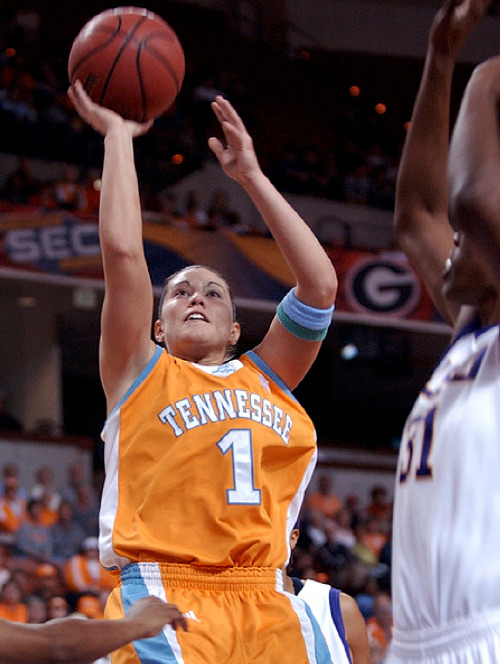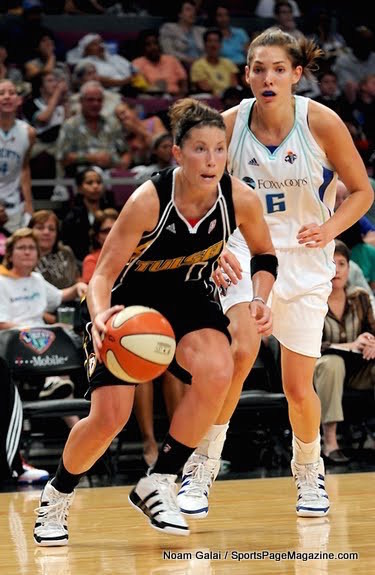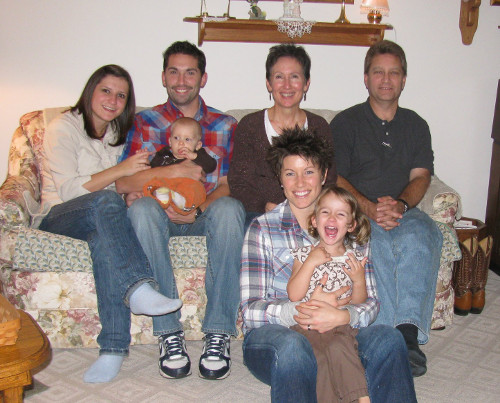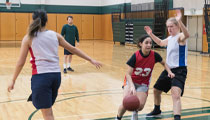Hoosier hoops star Zolman holds records; spreads word through FCA
By John Gillis on February 11, 2015 blog Print
Shanna Zolman shooting the ball while playing for the University of Tennessee
During her high school basketball career at Syracuse (Indiana) Wawasee High School, 5-foot-10 guard Shanna Zolman demonstrated pinpoint accuracy from the charity stripe as she set three national free-throw shooting records.
According to the NFHS’ National High School Sports Record Book, she set national marks for career free-throw shooting percentage (93.5 percent), single-season free-throw shooting percentage (95.4 percent) and consecutive free throws made (70). For good measure, she also compiled consecutive free throw streaks of 63 and 54, which ranked Nos. 2 and 3, respectively.
According to Zolman, the keys to her remarkable free-throw accuracy were not complicated.
“Shooting free throws is no different than shooting a field goal, except no one is guarding you,” Zolman noted. “Free throws are 90-percent mental. I had the same routine as a lot of free-throw shooters do – three dribbles and a spin – then shoot KNOWING it’s going in, just like I practiced thousands of times up to that point.”
In addition, Zolman set the Indiana high school girls basketball career scoring record of 3,085 points, surpassing Stephanie White-McCarty’s mark of 2,869 points. With a career scoring average of 33.6 points per game, she rounded out her glittering 93-game high school hoops resume with 730 rebounds, 453 steals and 430 assists.
“Personally, the high school basketball accomplishment I’m most proud of would be the career scoring record,” Zolman said. “Not necessarily because it's the record, but because of how the night went when I broke it. That night at Northside Gym was my favorite basketball memory that I have after all the years playing high school, playing at UT (the University of Tennessee), and professionally. Also, because it's just mine. There's only one Miss Basketball each year, but there have been many named. The record is solo.
“At an early age, I just fell in love with everything involved with the game of basketball - the teamwork, the game, the fans’ support, the greatest athletes, the locker room and the greatest opportunities.”
Interestingly, coaching Zolman during high school was a very familiar face – her father Kem.
“I started playing ball because my dad was a coach and I basically grew up in the gym. As I grew, so did my love for the game,” Zolman began. “I loved playing for my dad - we have a great relationship and I could trust him. He was harder on me to set an example and nothing was given for free. He was disciplined and a great coach. It took some time to figure out how to separate the court from home, but we figured it out so it didn't drive my mom and brother crazy.
“Playing high school basketball in Indiana was so special, as I gained a better understanding after high school. No one had the memories of fans, sold-out gyms, pep rallies, caravans, etc. Some of my greatest memories came in high school.”
In recognition of her exemplary high school basketball career, Zolman was named Indiana’s Miss Basketball for 2002 and was named a WBCA All-American. She scored 15 points in the 2002 WBCA High School All-American Game, and collected 21 points and five assists in the first-ever McDonald’s All-American Game for high school girls, in which she was named co-MVP for her efforts.
“Playing in the McDonald's All-American game was an AMAZING experience,” Zolman said. “I had so much fun there and it was eye-opening to see how my talents fared with the rest of the country. Ann Strother was the other co-MVP and some of the other players included Seimone Augustus, Tye Fluker, Nikki Blue and Barbara Turner.”
Following high school, Zolman traveled south to the University of Tennessee. Under the watchful tutelage of legendary Lady Volunteers head coach Pat Summitt, Zolman equally distinguished herself at the college level.
“The things that attracted me to the University of Tennessee were Pat Summitt … the best … success … discipline … national championships,” Zolman said. “Pat Summit IS one of the most influential people in my life. She was a disciplined perfectionist, as I like to describe her. I keep in regular contact with her and she has taught me some of the valuable life lessons I have ever learned. She has also helped me walk through the most difficult time in my life, five years after I graduated.”
Among some of her performances at UT, Zolman set NCAA single-season (95.7 percent in 2003-04) and career (91.6 percent) free-throw shooting records. In addition, she set several Lady Vols (short for “Lady Volunteers”) records, including single-game three-point field goals (7), single-season three-point field goals (103), career three-point field goals (266), career three-point shooting percentage (42.5 percent), single-season free-throw percentage (95.7 percent), and career free-throw percentage (91.6 percent). With 1,806 career points, Zolman ranks ninth in that category at UT.
Following the conclusion of her college career, Zolman was drafted in the second round of the 2006 WBNA Draft by the San Antonio Silver Spurs. During her rookie season, she averaged 6.6 points and ranked 13th in three-point shooting percentage. The following year, Zolman upped her scoring average to 9.2 points per game.

Zolman driving while playing for the Tulsa Shock
During the 2008 preseason, Zolman tore the anterior cruciate ligament of her left knee, which ended her season. Following successful knee surgery, she returned in May 2009 and was subsequently traded to the Tulsa Shock in April 2010. She then suffered a torn ACL while playing in Turkey and underwent another successful surgery. After rehabilitating her knee, Zolman was in the 2012 Shock training camp, but was cut from the team following a preseason game. Zolman then retired from the WNBA and is now with the Fellowship of Christian Athletes (FCA) in Seattle, Washington.
“The WNBA was fun,” Zolman opined. “It was a different game – faster, but more free for me after coming from a structured disciplined program like UT. The transition was much easier from college to pro. I loved it. However, injuries started catching up with me.
“I learned a lot at that point. Two years prior to that, I prayed God would give me a passion for something far greater than I ever had for ball. Ball was all I knew and loved with so much passion. I prayed I would know when it's time. After three surgeries on one knee, physically I wasn't the same but it was the loss of my competitive drive that helped me know it was time. With the coaching change in Tulsa they knew what they were looking for and I initially was cut. After returning to Seattle where I was involved in the ministry (FCA), I knew what I wanted to do. Tulsa called back to bring me back one week later and I told them no. God answered my prayers and I went where my passion was. That was ministry - not ball.
“I did some broadcasting during the last year in Tulsa, but no more. My relationship with Jesus Christ is my identity. It's who I am. He's my greatest passion. My deepest love. People can disagree or have their own views, faith or ‘religion,’ but what they can't argue with is my testimony and how He has shown Himself to me. I wouldn't devote my life to Him nor defend the faith (as if it needs defended) if He wasn't real ... if I've never experienced Him. He is who am I and the reason I exist. Ball for me is now simply a platform I use to share His good news.

Shown above seated left to right: Shanna’s sister-in-law Bria; Shanna’s brother Josh, who is holding his son Cohen; Shanna’s mother Lynette; and Shanna’s father Kem; seated front is Shanna holding her niece Amaya
“What I do with FCA is primarily discipleship/mentoring/counseling with student-athletes at the University of Washington and Seattle Pacific University. Many athletes come into college having the world promised to them. When injuries happen, no playing time, or their life isn't what they had in mind, then what? Often, they turn to suicide, self-harming practices, feeling lost because they have no backing or family. That's where I meet them. When life becomes real. Because I get it. I understand. It doesn't just stop with athletes, but that in general is what I do. I can't fix people's problems, but I can help introduce them to the One who can.”
John Gillis
John Gillis is the associate director of development of the NFHS. If you have any comments or articles ideas, please forward them to Gillis at [email protected]
Most Recent Articles
- nfhs news NFHS Learning Center Delivers 25 Millionth Course
- Track & Field/Cross Country article Effective Communication with Athletes and Coaches
- nfhs news Player Equipment Changes Highlight 2025 High School Football Rules Revisions
- Player Equipment Changes Highlight 2025 High School Football Rules Revisions
- nfhs news Judgment Call on Second Contact Eliminated in High School Volleyball





